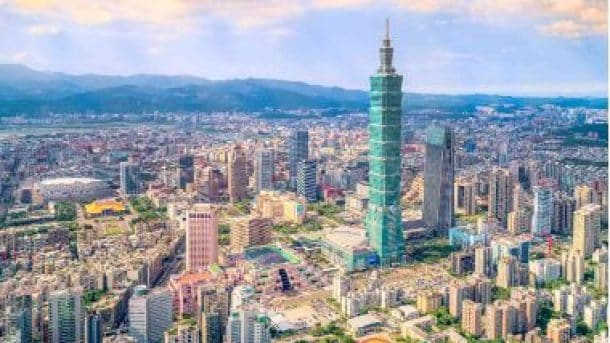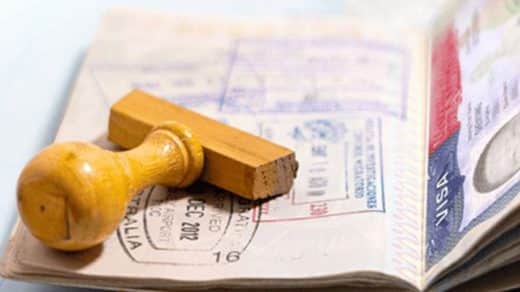Taiwan is an island that is home to a whole continent—one very green island! Underappreciated by visitors from the West, but as we found, those who manage to get here are in for a wonderful treat. With the turquoise Pacific on one side and green volcanic arcs on the other, your tour will take you past towering sea cliffs, gorges with marble walls, and tropical woods, to name just a few. It is no secret that the Portuguese word Ilha Formosa, which means “beautiful island,” is where Taiwan’s previous name, Formosa, originated. You will undoubtedly enjoy your trip to Taiwan, from the vibrant metropolis of Taipei to the breathtaking natural beauty found in Taroko and Yangmingshan National Parks, as well as surfing on the beaches of Kenting National Park.
Add mouthwatering cuisine, customary celebrations, and flamboyant temples, and you may conclude that this small island has the best of Asia.
In April and May of 2019, we traveled to the north and northeast of Taiwan for a little over a month. We decided against going south because the rainy season was coming early, but we will undoubtedly return to see more of this amazing nation.
Currency:
New Taiwan Dollar (NT$); this link shows the current exchange rate.
Electrical power:
110 volts AC. Power outlets come in two varieties: type A flat two-prong sockets and type B flat three-prong sockets, both of which can accommodate type A plugs. To ensure that you can use all of your electronic devices when traveling, make sure you have a universal travel adaptor.
Safety:
Traveling through the majority of Taiwan is extremely safe. Even the rates of minor crimes are quite low, but be cautious when carrying valuables because pick-pocketing and bag-snatching do happen, particularly in tourist areas. There is a significant risk of earthquakes in Taiwan. Typhoon dangers also exist, particularly from July to November, thus visitors are advised to avoid the highlands during these times.Avoid traveling without travel insurance at all costs! For the best coverage for active travelers, we recommend looking into World Nomads for travel insurance.
Language:
Taiwanese Mandarin, a dialect of Mandarin Chinese, is the official language of Taiwan. Nonetheless, Hokkien, the native language of Taiwan, is spoken by over 70% of the people. It can be difficult to get by in most of Taiwan because very little English is spoken or understood, especially outside of the popular tourist destinations. Make sure you have access to Google Translate!
Ideal Time to Travel to Taiwan
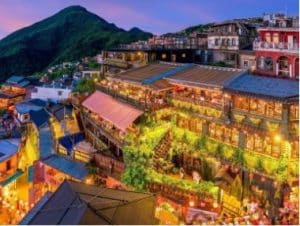
The months of April through June in the spring and September through November in the fall are the ideal times to travel to Taiwan. Spring is a great time of year to visit because it’s the shoulder season, which means less tourists arrive. The weather is also warm and pleasant.
In Taiwan, spring is a lovely time of year since the colors are at their peak. This is the ideal season to explore Taroko National Park, Yangmingshan National Park, the Elephant Mountain, and the Alishan National Scenic Area if you enjoy hiking. In May or June, there is also the Dragon Boat Festival. The entire nation begins to cool off during the fall, and although there are still sporadic showers, the amount of rain is significantly lower during this time.
The country’s north is starting to drop off, while the south continues to be warm. Especially Taroko National Park, Sun Moon Lake, Alishan National Scenic Area, and the Yushan (Jade Mountain) are excellent places to visit in south and east Taiwan during this time of year. October is the Mid-Autumn Moon Festival, while September is Confucius’s Birthday. The frequency of rainfall increases at the end of May and June.
Although July and August are thought to be the busiest travel months, it may be extremely hot and muggy during this time, and hotel prices are also higher. Summer lasts from the end of June to the beginning of August. Both the temperature and the amount of rainfall rise significantly.
These are going to be hot and muggy months in Taiwan, with June being the wettest. The northern portion of the nation experiences somewhat more tolerable weather. During this season, typhoons are also frequent, so before you travel, make sure to check the weather prediction.
Even though December through March is regarded as both winter and the off-peak travel season, this is the best time to visit Taiwan if you’re on a tight budget because there will be amazing deals available everywhere in the nation. However, depending on where you are, it can be quite damp. Although it becomes rather frigid in the north, December is Taiwan’s coldest month and still relatively warm compared to European winters.The hot springs, especially Beitou, are the main draw during this season. Furthermore, Yangmingshan National Park offers breathtaking mountain retreats. Compared to the beaches in the north, the beaches in the south will be much warmer and drier. Everywhere in the nation is a beautiful place to celebrate the Chinese New Year, which falls between December and January.
TAIWAN TRAVEL COSTS
The price of a trip to Taiwan can vary significantly based on a number of variables, including your preferred mode of transportation, length of stay, lodging type, food preferences, and scheduled activities. Here is a summary of some common costs to take into account when planning a budget for a trip to Taiwan:
Flights:
The price of your ticket to Taiwan will vary depending on a number of factors, including where you are departing from, when you book, and whether you select business, premium economy, or economy class. For a round-trip ticket, costs might vary from several hundred to more than a thousand dollars. Always use SkyScanner to locate the lowest flights.
Accommodation:
The price of your stay will depend on the kind of lodging you select. While mid-range hotels charge between $50 and $100 per night, luxury hotels can cost $100 or more. Hostels and inexpensive guesthouses usually charge between $15 and $30 per night.
Transportation:
The cost of transportation within Taiwan can be divided into four categories: Taipei Metro (fares from $0.50 to $1.50 per ride), intercity train tickets (from $20 to $50 depending on class and distance), intercity bus tickets (from $5 to $20 depending on distance), and taxi fares (from around $2.20 to $50 depending on distance).
Food:
Taiwan is well-known for its wonderful and varied cuisine, which offers options for any budget. Whereas casual restaurants usually charge $5 to $15 per meal, street food vendors and neighborhood restaurants provide reasonably priced meals between $2 and $5. Fine dining venues can charge $30 or more each dinner, while mid-range restaurants may charge $15 to $30.
Activities & Attractions:
General admission prices for museums, temples, and national parks range from $1 to $10 per person. The cost of guided tours and activities, such hiking or city tours, can vary from $20 to $100 based on their length and level of difficulty.
Other costs could include buying a SIM card for mobile data (which can cost anywhere from $5 to $20, depending on data allotment), shopping, souvenirs, travel insurance, and other unanticipated costs.
In general, the cost of visiting Taiwan might vary significantly based on your tastes and itinerary. While mid-range travelers may budget $100 to $200 per day or more, budget travelers may aim to spend between $50 and $100 per day. It’s crucial to thoroughly plan and research your vacation to make sure you have enough money set aside for the comfort and pleasures you want.
Travel advice for Taiwan
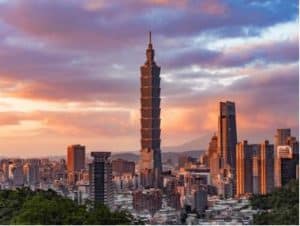
Taiwan’s lively culture, mouthwatering food, and breathtaking natural scenery make for an intriguing and fulfilling travel experience. To help you get the most out of your vacation, consider the following travel advice:
Indulge in some street food:
Taiwan is well-known for this tradition. Try the local specialties, including as stinky tofu, beef noodle soup, and bubble tea from night markets and street sellers. These gastronomic encounters are not to be missed.
Take Public Transportation:
Taipei’s public transportation system is particularly good in Taiwan. Make economical and effective use of the Taipei Metro, buses, and trains for transportation. To save money on transit costs and enjoy convenience, think about purchasing an EasyCard.
Discover Areas Outside of Taipei:
Although there is a lot to see and do in Taipei, don’t pass up the chance to travel to other regions of Taiwan. Visit the picturesque Sun Moon Lake in Nantou, the historic city of Tainan, or the breathtaking Taroko Gorge in Hualien.
Respect Local Customs:
Although Taiwanese people are generally kind and amiable, it is important to observe local etiquette and customs.For instance, it’s traditional to take off your shoes when visiting certain temples or someone’s home. It can also be beneficial to learn a few simple Mandarin phrases, such “hello” (nǐ hǎo) and “thank you” (xièxiè).
Keep Connected with Free Wi-Fi:
Airports, metro stations, and cafes are just a few of the public spaces in Taiwan that provide free Wi-Fi. To make communication with locals easier and to traverse the city, download translation apps and offline maps.
Experience Traditional Festivals:
If at all feasible, schedule your vacation to coincide with one of Taiwan’s traditional celebrations, such the Dragon Boat Festival or the Lantern Festival. These festivities provide a fascinating look into Taiwanese customs and culture.
Keep Yourself Hydrated and Safe:
Traveling to Taiwan is typically safe, but you should still exercise common sense care. Drink plenty of water, especially in the summer when it’s hot and muggy, and use caution when crossing the street because traffic in cities can be heavy.
Taiwan has a subtropical climate with distinct seasons, so be prepared for the weather. Make sure to bring appropriate clothing, particularly if you’ll be visiting hilly regions where it may be colder. Typhoon season usually lasts from June to October, so if you want to travel during this time, pay attention to weather reports and potential delays.
Honor the Natural World:
Taiwan is endowed with stunning mountain, forest, and beach scenery. By staying on approved pathways, properly disposing of rubbish, and showing care for wildlife, you may engage in responsible tourism.
Try Temple Etiquette:
Dress modestly and take off your hat before entering temples or other places of worship. When shooting pictures, be careful not to touch or disrupt holy artifacts, especially during worship or celebrations.
FOOD IN TAIWAN

Although largely inspired by Chinese and Japanese food, Taiwanese cuisine is fundamentally Taiwanese. Taiwanese people are known for their love of food, which is shown in the variety of influences seen in their cuisine. Additionally, most towns and cities have a signature dish that has made them famous. Taiwan is known for its vibrant night markets and you will struggle to locate a great meal at a reasonable price on any given corner. Whatever your inclinations, all you have to do to be in heaven is locate the closest night market. Also, compared to most other countries, vegetarians are given better consideration.
WHERE IN TAIWAN TO STAY
The range of lodging alternatives in Taiwan is enormous, ranging from $3 hostels to $100 hotels. The best variety can be found in more expensive cities like Taipei, Taichung, and Kaohsiung. There are many deals available if you can stay for a longer amount of time and have flexible dates, although there might be intense competition. We traveled around the North and Northeast of Taiwan for four weeks in April 2019 and ended up spending $30 each night on average.
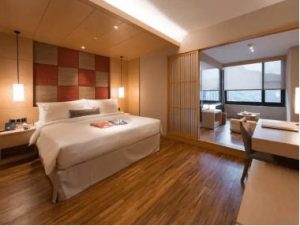
Selecting the ideal base for your first trip to Taiwan is essential to taking in all of the island’s many attractions, which range from thriving cities to tranquil nature settings. Below is a summary of the best locations and lodging options:
Where to stay in Taipei:
Taiwan’s energetic capital city is well-known for its modern skyscrapers, lively night markets, and ancient temples. Taipei offers the ideal fusion of convenience, culture, and food.
- On a tight budget? The Meander Taipei Hostel offers reasonably priced dorm beds as well as a convenient position close to Taipei’s top attractions and transportation hubs.
- Mid-range: With convenient access to Taipei’s dining and shopping areas, the Green World Hotel Zhonghua offers cozy lodgings equipped with contemporary conveniences. The hostel has both private rooms and dorm-style accommodations with bunk beds.
There is a rooftop patio, living area, and common kitchen where visitors may mingle and take in city views. Meander Taipei Hostel’s dynamic atmosphere and reasonable prices make it a popular choice for budget and backpacking tourists.
- Luxurious: Choose the five-star Mandarin Oriental Taipei, which is situated in Taipei, Taiwan’s Da’an District, for its opulent atmosphere. It is well known for its exquisite design, opulent lodgings, and flawless service. The hotel offers large, elegantly furnished rooms and suites with modern furnishings and premium services.
The Best Value Tip:Travel to Taipei in the spring or fall to take advantage of lower hotel costs and more comfortable temperatures while still seeing exciting festivals and cultural events.
Where to stay in Taichung:
Known for its bustling art scene, beautiful parks, and vibrant street food culture, Taichung is Taiwan’s center of culture and the arts. It offers a laid-back vibe and convenient access to neighboring sites like Sun Moon Lake.
- On a tight budget? The Loft 18 Hostel offers reasonably priced accommodations in a convenient position close to Taichung’s night markets and art galleries.
- Mid-range: With its modern decor and cozy accommodations, the Tempus Hotel Taichung-Dadun offers quick access to Taichung’s entertainment and retail districts.
- Choose the Evergreen Laurel Hotel Taichung for its opulent atmosphere, which includes high-end accommodations, a rooftop swimming pool, and expansive city views.
Best Value Advice: If you’re looking for reasonably priced and excellent dining options, especially for Taiwanese snacks and specialties, check out Taichung’s local markets and food streets.

